新概念第一册 Lesson 85-86课(共29张PPT)
文档属性
| 名称 | 新概念第一册 Lesson 85-86课(共29张PPT) | 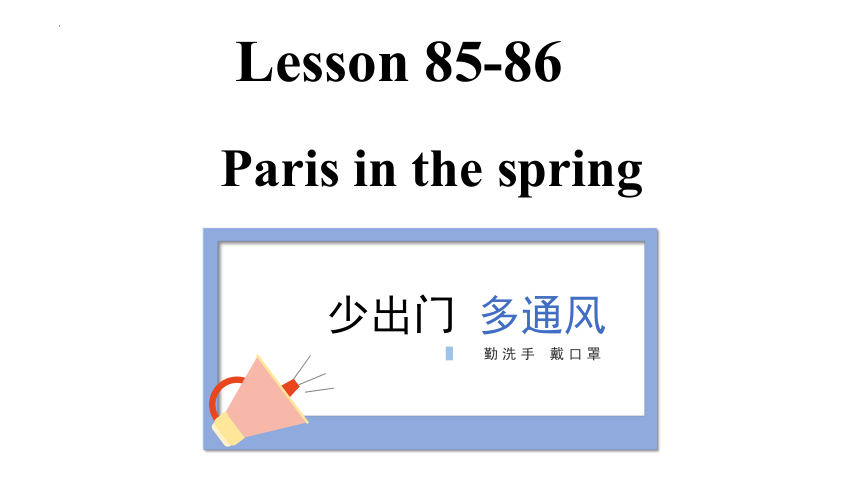 | |
| 格式 | pptx | ||
| 文件大小 | 11.1MB | ||
| 资源类型 | 教案 | ||
| 版本资源 | 新概念英语 | ||
| 科目 | 英语 | ||
| 更新时间 | 2024-07-30 09:32:47 | ||
图片预览

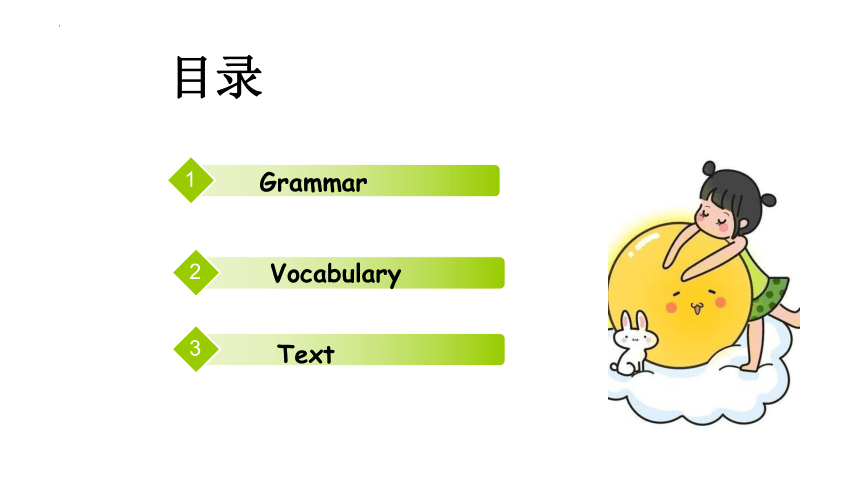
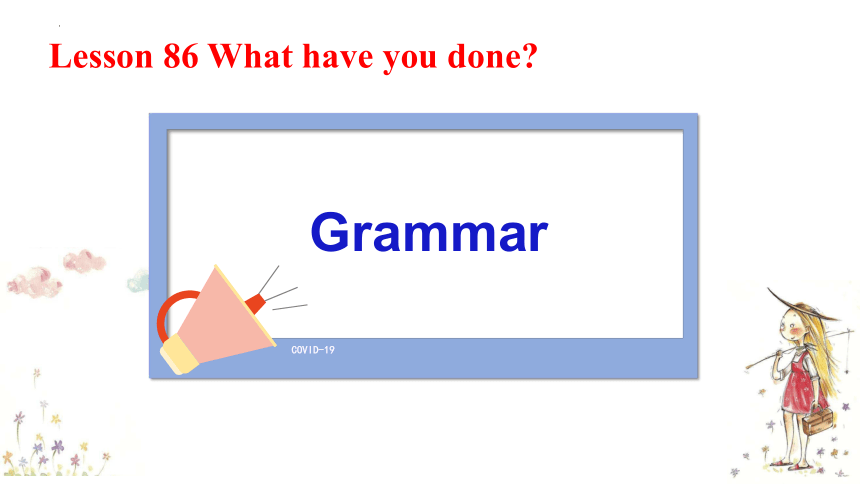
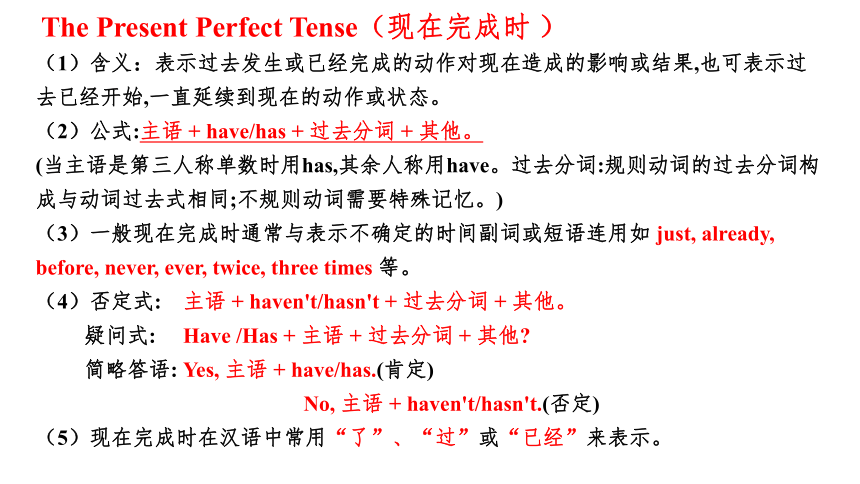
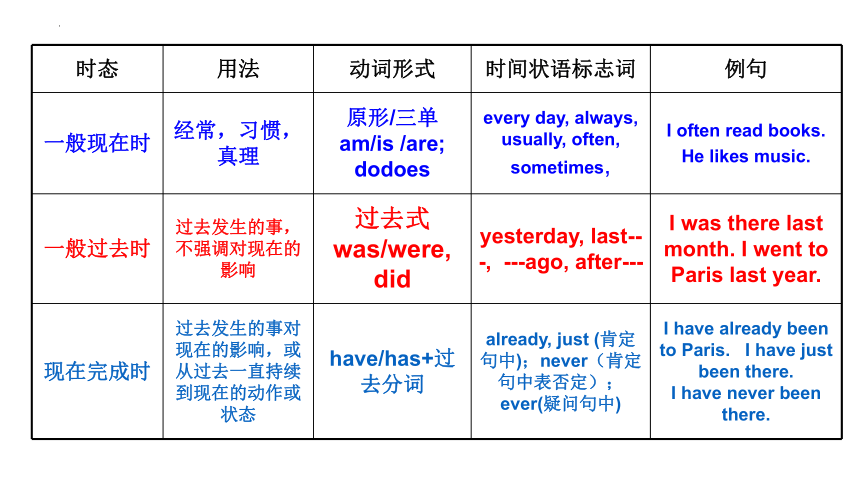
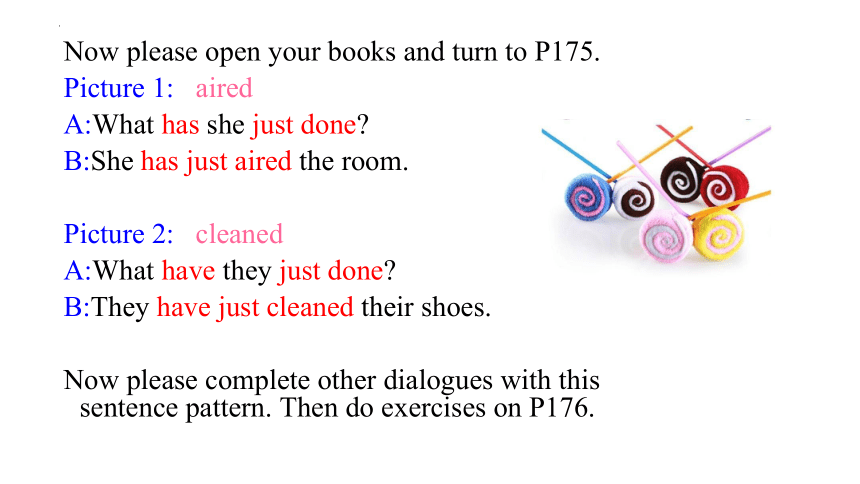
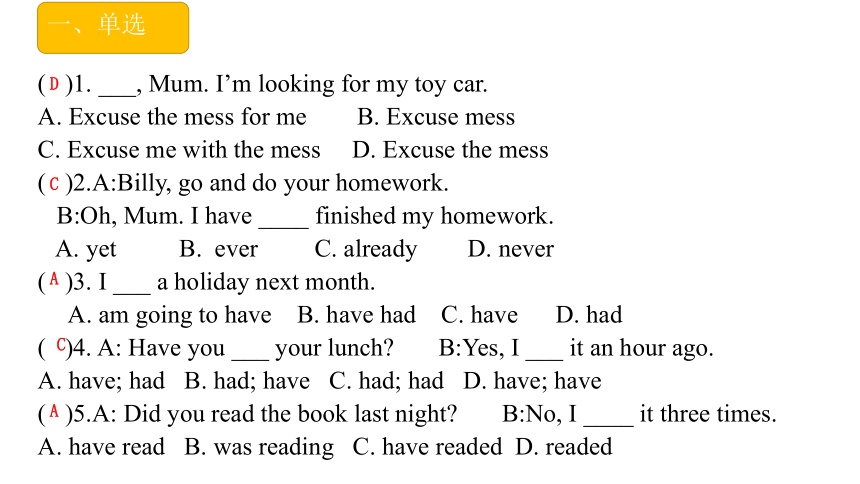
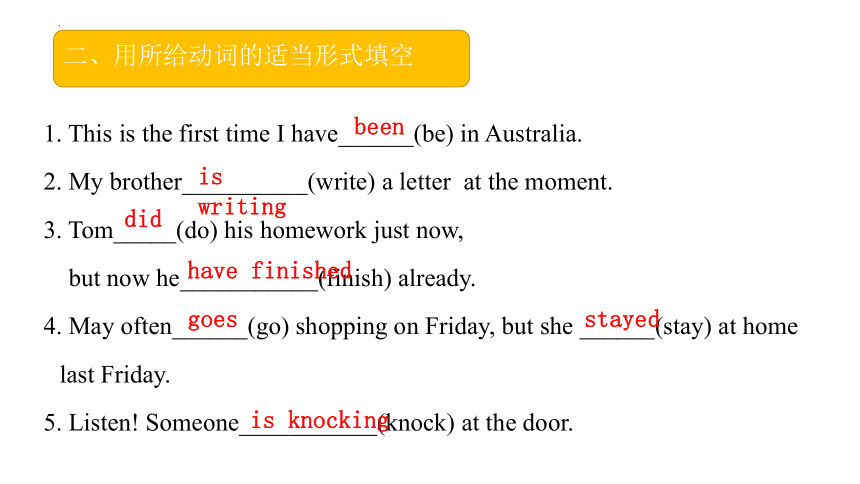
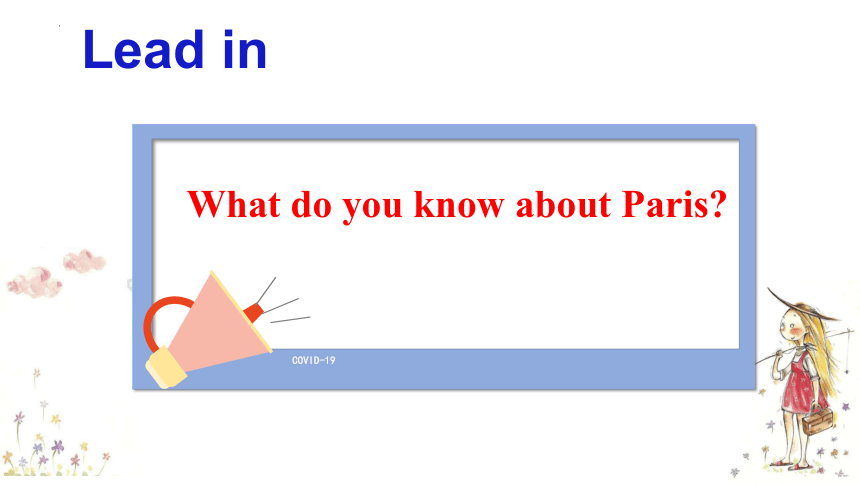
文档简介
(共29张PPT)
少出门 多通风
勤洗手 戴口罩
Lesson 85-86
Paris in the spring
目录
Grammar
1
Vocabulary
2
Text
3
COVID-19
Grammar
Lesson 86 What have you done
The Present Perfect Tense(现在完成时 )
(1)含义:表示过去发生或已经完成的动作对现在造成的影响或结果,也可表示过去已经开始,一直延续到现在的动作或状态。
(2)公式:主语 + have/has + 过去分词 + 其他。
(当主语是第三人称单数时用has,其余人称用have。过去分词:规则动词的过去分词构成与动词过去式相同;不规则动词需要特殊记忆。)
(3)一般现在完成时通常与表示不确定的时间副词或短语连用如 just, already, before, never, ever, twice, three times 等。
(4)否定式: 主语 + haven't/hasn't + 过去分词 + 其他。
疑问式: Have /Has + 主语 + 过去分词 + 其他
简略答语: Yes, 主语 + have/has.(肯定)
No, 主语 + haven't/hasn't.(否定)
(5)现在完成时在汉语中常用“了”、“过”或“已经”来表示。
时态 用法 动词形式 时间状语标志词 例句
一般现在时 经常,习惯,真理 原形/三单am/is /are; dodoes every day, always, usually, often, sometimes, I often read books.
He likes music.
一般过去时 过去发生的事,不强调对现在的影响 过去式was/were, did yesterday, last---, ---ago, after--- I was there last month. I went to Paris last year.
现在完成时 过去发生的事对现在的影响,或从过去一直持续到现在的动作或状态 have/has+过去分词 already, just (肯定句中);never(肯定句中表否定);ever(疑问句中) I have already been to Paris. I have just been there. I have never been there.
Now please open your books and turn to P175.
Picture 1: aired
A:What has she just done
B:She has just aired the room.
Picture 2: cleaned
A:What have they just done
B:They have just cleaned their shoes.
Now please complete other dialogues with this sentence pattern. Then do exercises on P176.
( )1. ___, Mum. I’m looking for my toy car.
A. Excuse the mess for me B. Excuse mess
C. Excuse me with the mess D. Excuse the mess
( )2.A:Billy, go and do your homework.
B:Oh, Mum. I have ____ finished my homework.
A. yet B. ever C. already D. never
( )3. I ___ a holiday next month.
A. am going to have B. have had C. have D. had
( )4. A: Have you ___ your lunch B:Yes, I ___ it an hour ago.
A. have; had B. had; have C. had; had D. have; have
( )5.A: Did you read the book last night B:No, I ____ it three times.
A. have read B. was reading C. have readed D. readed
D
C
A
C
A
一、单选
1. This is the first time I have______(be) in Australia.
2. My brother__________(write) a letter at the moment.
3. Tom_____(do) his homework just now,
but now he___________(finish) already.
4. May often______(go) shopping on Friday, but she ______(stay) at home last Friday.
5. Listen! Someone___________(knock) at the door.
been
is writing
is knocking
goes
stayed
have finished
did
二、用所给动词的适当形式填空
COVID-19
Lead in
What do you know about Paris
the Eiffel Tower
The Eiffel Tower is a famous landmark in Paris.
What do you know about Paris
地标
Arch deTriomphe
Arch de Triomphe is to honour a victory in war.
凯旋门正如其名,是一座迎接外出征战的军队凯旋的大门。它是现今世界上最大的一座圆拱门,位于巴黎市中心戴高乐广场中央的环岛上面。这座广场也是配合雄狮凯旋门而修建的,因为凯旋门建成后,给交通带来了不便,于是就在19世纪中叶,环绕凯旋门一周修建了一个圆形广场及12条道路,每条道路都有40~80米宽,呈放射状,就像明星发出的灿烂光芒,因此这个广场又叫明星广场。凯旋门也称为“星门”。凯旋门就位于著名的香榭丽舍大街的尽头。
Notre Dame de Paris
Europe's most famous Gothic church
Which film do you like best
A
B
C
D
Paris in the spring
Paris n. 巴黎
cinema n. 电影院
film n. 电影;胶卷
beautiful adj. 漂亮的
city n. 城市
never adv. 从来没有
ever adv. 在任何时候
New words and expressions
film n. 电影
看电影
see a film
see a movie
go to the cinema
go to the movies
cinema n. 电影院
beautifully 漂亮地
beauty n. 美人,美景,美好的东西
beauty contest 选美
beautiful adj. 漂亮的
the most beautiful
more beautiful
She is much more beautiful than I imagined.
她甚至比我想象中的美得多。
I will never forget your kindness.
我永远忘不了你的好意。
Have you ever been to Paris
你曾去过巴黎吗?
活到老,学到老。
One is never too old to learn.
Could we ever get permission
我们会被允许吗?
never 决不, 从不
ever 曾经,永远,究竟
Text
At what time of the year did Ken visit Paris
Watch and answer
1. What is on in the cinema
2. Has George seen the film
3. When did he see it
Paris in the Spring is on.
Yes, he has.
He saw it on TV last year.
Read and answer more questions
4. How is the film
It’s an old film, but it’s very good.
Have you just been to the cinema
现在完成时,表示去过某地而现在已经回来了。
这里的just是“刚刚,刚才”的意思。
What’s on
这里的be on是“上演”的意思
有一个新电影正在上演。
A new film is on now.
今天晚上电视上有什么节目?
What’s on television tonight
in spring/summer/autumn/winter 在季节前是不用加定冠词的
‘Paris in the Spring’
指的是具体的一个春天在巴黎发生的事情,所以加定冠词。
I’ve already seen it.
现在完成时(画外音:我知道那电影的内容)
I saw it on television last year.
一般过去时(强调在过去的某个具体的时间发生的事)
It’s an old film, but it’s good.
一般现在时(对这部电影的一般性评价)
I have already seen the film.
I ______ _____ the film ____. (否定句)
____ ____ seen the film ____ (一般疑问句)
Yes, I _____./ No, I _______.
_____ _____ you already _____ (划线提问)
She has already finished practicing the piano.
(改否定句 、一般疑问句、肯定否定回答、划线提问)
haven’t seen
yet
Have you
yet
have
haven’t
What have
done
我读过那本书。我昨天读的。它是本老书,但是还是很有趣。
I have read this book. I read it yesterday. It’s old, but it’s very interesting.
never和ever都是完成时的标志词,但要注意用法的区别:
never 通常用于陈述句中,表示“绝不、从来没有”。
ever 通常用于疑问句中,表示“曾经、在任何时候”。
仿写句子:
现在完成时的特殊结构
have/has been to sp
去过某地,已回
have/has gone to sp
去了某地,未回
I've never been there.
Have you ever been there, Ken
我爸爸去了香港。
My father has gone to H.K..
我爸爸去过香港。
My father has been to H.K..
我爸爸只有45岁,但是几乎世界上的所有国家他都去过。
My father is only 45 years old. But he has already been to nearly every country in the world.
I’ve never been there. 我从未去过。
Have you ever been there, Ken 肯,你去过吗?
never: 从来没有,用于肯定句中表否定,表示绝不,从来没有。
ever: 在任何时候,用于疑问句,表示曾经,在任何时候。
never 和 ever 都是完成时态的标志词。
他从来没有去过北京。
He has never been to Beijing.
Have you ever been to Beijing
你以前去过北京吗?
It rained all the time. 一直、始终
= The rain never stopped.
Just like London!
= The weather in Paris in spring is just like the weather in London in spring.
这里的just是“就、正好、恰恰”的意思。【比较上文】
这里的like是“像”的意思。
酒店就像家一样。 The hotel is just like home.
夏威夷就像天堂一样。 Hawai is just like heaven.
Homework
不
多
哟
!
准备Lesson85-86的听写。
发Lesson 85-86的录音(课文读一遍,单词两遍)。
听读并背诵Lesson85的课文。
完成配套练习作业+抄写单词两遍。
少出门 多通风
勤洗手 戴口罩
Lesson 85-86
Paris in the spring
目录
Grammar
1
Vocabulary
2
Text
3
COVID-19
Grammar
Lesson 86 What have you done
The Present Perfect Tense(现在完成时 )
(1)含义:表示过去发生或已经完成的动作对现在造成的影响或结果,也可表示过去已经开始,一直延续到现在的动作或状态。
(2)公式:主语 + have/has + 过去分词 + 其他。
(当主语是第三人称单数时用has,其余人称用have。过去分词:规则动词的过去分词构成与动词过去式相同;不规则动词需要特殊记忆。)
(3)一般现在完成时通常与表示不确定的时间副词或短语连用如 just, already, before, never, ever, twice, three times 等。
(4)否定式: 主语 + haven't/hasn't + 过去分词 + 其他。
疑问式: Have /Has + 主语 + 过去分词 + 其他
简略答语: Yes, 主语 + have/has.(肯定)
No, 主语 + haven't/hasn't.(否定)
(5)现在完成时在汉语中常用“了”、“过”或“已经”来表示。
时态 用法 动词形式 时间状语标志词 例句
一般现在时 经常,习惯,真理 原形/三单am/is /are; dodoes every day, always, usually, often, sometimes, I often read books.
He likes music.
一般过去时 过去发生的事,不强调对现在的影响 过去式was/were, did yesterday, last---, ---ago, after--- I was there last month. I went to Paris last year.
现在完成时 过去发生的事对现在的影响,或从过去一直持续到现在的动作或状态 have/has+过去分词 already, just (肯定句中);never(肯定句中表否定);ever(疑问句中) I have already been to Paris. I have just been there. I have never been there.
Now please open your books and turn to P175.
Picture 1: aired
A:What has she just done
B:She has just aired the room.
Picture 2: cleaned
A:What have they just done
B:They have just cleaned their shoes.
Now please complete other dialogues with this sentence pattern. Then do exercises on P176.
( )1. ___, Mum. I’m looking for my toy car.
A. Excuse the mess for me B. Excuse mess
C. Excuse me with the mess D. Excuse the mess
( )2.A:Billy, go and do your homework.
B:Oh, Mum. I have ____ finished my homework.
A. yet B. ever C. already D. never
( )3. I ___ a holiday next month.
A. am going to have B. have had C. have D. had
( )4. A: Have you ___ your lunch B:Yes, I ___ it an hour ago.
A. have; had B. had; have C. had; had D. have; have
( )5.A: Did you read the book last night B:No, I ____ it three times.
A. have read B. was reading C. have readed D. readed
D
C
A
C
A
一、单选
1. This is the first time I have______(be) in Australia.
2. My brother__________(write) a letter at the moment.
3. Tom_____(do) his homework just now,
but now he___________(finish) already.
4. May often______(go) shopping on Friday, but she ______(stay) at home last Friday.
5. Listen! Someone___________(knock) at the door.
been
is writing
is knocking
goes
stayed
have finished
did
二、用所给动词的适当形式填空
COVID-19
Lead in
What do you know about Paris
the Eiffel Tower
The Eiffel Tower is a famous landmark in Paris.
What do you know about Paris
地标
Arch deTriomphe
Arch de Triomphe is to honour a victory in war.
凯旋门正如其名,是一座迎接外出征战的军队凯旋的大门。它是现今世界上最大的一座圆拱门,位于巴黎市中心戴高乐广场中央的环岛上面。这座广场也是配合雄狮凯旋门而修建的,因为凯旋门建成后,给交通带来了不便,于是就在19世纪中叶,环绕凯旋门一周修建了一个圆形广场及12条道路,每条道路都有40~80米宽,呈放射状,就像明星发出的灿烂光芒,因此这个广场又叫明星广场。凯旋门也称为“星门”。凯旋门就位于著名的香榭丽舍大街的尽头。
Notre Dame de Paris
Europe's most famous Gothic church
Which film do you like best
A
B
C
D
Paris in the spring
Paris n. 巴黎
cinema n. 电影院
film n. 电影;胶卷
beautiful adj. 漂亮的
city n. 城市
never adv. 从来没有
ever adv. 在任何时候
New words and expressions
film n. 电影
看电影
see a film
see a movie
go to the cinema
go to the movies
cinema n. 电影院
beautifully 漂亮地
beauty n. 美人,美景,美好的东西
beauty contest 选美
beautiful adj. 漂亮的
the most beautiful
more beautiful
She is much more beautiful than I imagined.
她甚至比我想象中的美得多。
I will never forget your kindness.
我永远忘不了你的好意。
Have you ever been to Paris
你曾去过巴黎吗?
活到老,学到老。
One is never too old to learn.
Could we ever get permission
我们会被允许吗?
never 决不, 从不
ever 曾经,永远,究竟
Text
At what time of the year did Ken visit Paris
Watch and answer
1. What is on in the cinema
2. Has George seen the film
3. When did he see it
Paris in the Spring is on.
Yes, he has.
He saw it on TV last year.
Read and answer more questions
4. How is the film
It’s an old film, but it’s very good.
Have you just been to the cinema
现在完成时,表示去过某地而现在已经回来了。
这里的just是“刚刚,刚才”的意思。
What’s on
这里的be on是“上演”的意思
有一个新电影正在上演。
A new film is on now.
今天晚上电视上有什么节目?
What’s on television tonight
in spring/summer/autumn/winter 在季节前是不用加定冠词的
‘Paris in the Spring’
指的是具体的一个春天在巴黎发生的事情,所以加定冠词。
I’ve already seen it.
现在完成时(画外音:我知道那电影的内容)
I saw it on television last year.
一般过去时(强调在过去的某个具体的时间发生的事)
It’s an old film, but it’s good.
一般现在时(对这部电影的一般性评价)
I have already seen the film.
I ______ _____ the film ____. (否定句)
____ ____ seen the film ____ (一般疑问句)
Yes, I _____./ No, I _______.
_____ _____ you already _____ (划线提问)
She has already finished practicing the piano.
(改否定句 、一般疑问句、肯定否定回答、划线提问)
haven’t seen
yet
Have you
yet
have
haven’t
What have
done
我读过那本书。我昨天读的。它是本老书,但是还是很有趣。
I have read this book. I read it yesterday. It’s old, but it’s very interesting.
never和ever都是完成时的标志词,但要注意用法的区别:
never 通常用于陈述句中,表示“绝不、从来没有”。
ever 通常用于疑问句中,表示“曾经、在任何时候”。
仿写句子:
现在完成时的特殊结构
have/has been to sp
去过某地,已回
have/has gone to sp
去了某地,未回
I've never been there.
Have you ever been there, Ken
我爸爸去了香港。
My father has gone to H.K..
我爸爸去过香港。
My father has been to H.K..
我爸爸只有45岁,但是几乎世界上的所有国家他都去过。
My father is only 45 years old. But he has already been to nearly every country in the world.
I’ve never been there. 我从未去过。
Have you ever been there, Ken 肯,你去过吗?
never: 从来没有,用于肯定句中表否定,表示绝不,从来没有。
ever: 在任何时候,用于疑问句,表示曾经,在任何时候。
never 和 ever 都是完成时态的标志词。
他从来没有去过北京。
He has never been to Beijing.
Have you ever been to Beijing
你以前去过北京吗?
It rained all the time. 一直、始终
= The rain never stopped.
Just like London!
= The weather in Paris in spring is just like the weather in London in spring.
这里的just是“就、正好、恰恰”的意思。【比较上文】
这里的like是“像”的意思。
酒店就像家一样。 The hotel is just like home.
夏威夷就像天堂一样。 Hawai is just like heaven.
Homework
不
多
哟
!
准备Lesson85-86的听写。
发Lesson 85-86的录音(课文读一遍,单词两遍)。
听读并背诵Lesson85的课文。
完成配套练习作业+抄写单词两遍。
同课章节目录
